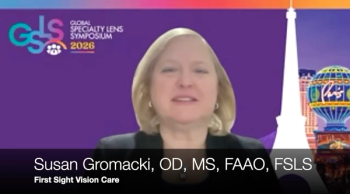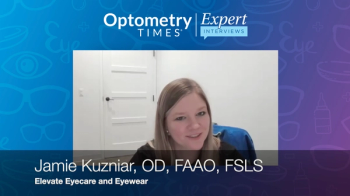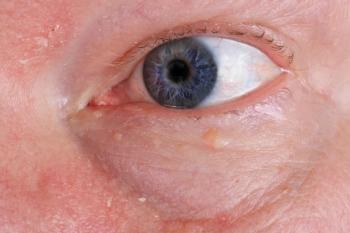
VEW 2024: What to know when starting a speciality contact lens practice
Mile Brujic, OD, FAAO, outlines the essentials to starting a speciality contact lens practice, including speciality competency and accessing resources.
Amid a sea of opinions, strategies, and resources, starting a speciality practice can be a daunting task. Mile Brujic, OD, FAAO, said that his secret to jumpstarting these practices is to never rid yourself of the student mindset. In his Vision Expo West 2024 presentation, "Blueprint for Success: Starting a speciality contact lens practice," he outlines his tips and tricks to successfully provide speciality care to patients.
Video transcript
Editor's note: This transcript has been lightly edited for clarity.
Emily Kaiser Maharjan:
Hi everyone. I'm here with Dr. Mile Brujic, who's here to talk about Vision Expo West and some of the presentations that he will be doing there. So welcome, Dr. Brujic. I'm glad you could join us.
Mile Brujic, OD, FAAO:
Yeah, glad to be here, and thank you for having me, Emily.
Kaiser Maharjan:
Of course. So one of your many talks is on a Blueprint for Success, which is on starting a specialty contact lens practice, which we'll be giving with Dr Shalu Pal. Can you tell me a little bit about that presentation?
Brujic:
It's actually a topic that I'm passionate about, because we did this 16, 17 years ago, where we started to actually formulate more of a specialty lens emphasis in our practice. And what we realized was we evolved with the technologies. And when you fast forward to today, there are a number of technologies, and there are a number of facets that are involved in really creating and starting that specialty lens care, but there's ways that you can do it that don't necessarily require a lot of capital investment. And what we do is we simply go through those processes with some of the basics around first and foremost, taking kind of a stock of all the specialty lens options that are available, and then figuring out how each one of those has a role with all the specific patients. A few areas that we spend a lot of time on is the irregular cornea and the different options for those patients, honing in on scleral lenses. We also talk about myopia progression management, where there are a number of tools that are now currently available to help manage progression that will predictably happen in those younger children or individuals who have progressive myopia. And again, we go step by step on how to really formulate this as a process in the practice. And we also even touch on the billing and coding side of things as well too, because ultimately, if we can't translate what we're doing into the appropriate billing and coding, ICD and CPT codes, it's not going to be something that's going to be viable in our practices.
Kaiser Maharjan:
Yeah, absolutely. And can you tell me a little bit about some indicators that moving into the specialty contact lens space is a good fit for a practice?
Brujic:
Yeah. So one, I think the practitioner has to be passionate about it. They have to have the first initial experiences with a lens or a lens type, where they see the results. And that's what ultimately creates clinical passion around any of the things that we start to specialize in. And then when you do that, you start to look and see what's the unmet need around that. Before we can ask that question, though, we have to be well versed around the lenses that we're fitting. So I'll use scleral lenses as an example. The first question I get is: what sclera lens should I be fitting for my patients? And the reality is, is we have a lot of options, and they're all great options, so you're not going to make a wrong choice initially, but you have to really say, "Alright, I'm going to start with this fitting set," – and it's usually through the laboratory that you're currently working through – and you say, :I'm going to use this set, and I'm going to understand and learn and know this set, and the intricacies around this set, and I'm going to become an expert in this set." And then you'll start to see where the unmet needs are, the gaps are, from where you say, "There's a few things that I'd like to do that I don't know if I can do with this lens design. Let's try a second set." And usually what we'll do is we'll have 2 or 3 sets that we have access to in the office, so we can pivot on those. But you can't start with 2 or 3 sets. If you start with 2 or 3 sets, then you're going to get lost in the minutiae around each of the fitting guides. You really have to establish that first one that you're an expert in, and then you start expanding those sets from there. So those are things that are critically important, making sure you understand the lens that you're selecting and becoming a true expert at it.
Kaiser Maharjan:
Yeah, absolutely. And do you have any other advice for somebody who's maybe interested in dipping their toe into the specialty contact lens side of things, but isn't quite sure about where to begin?
Brujic:
Yeah, so there's a few things. There's a lot of great resources. The Scleral Lens Society is a great resource. The GPLI is an absolutely fantastic resource. But ultimately, you want to first make sure you're clinically competent in what you're doing, and then the second thing you do is you want to make sure you're coding it correctly. Emily, just as a perfect example, whenever we bring a new technology in, we usually don't initially charge for it. I actually have, usually 2, 3, or 4 patients that I'm testing it out on, and we kind of say, "This is like a service that we're going to provide to you. We're the first in the area to have XYZ, but we want to gain additional experience with it. This is what we expect to happen, and is this something that you're interested in?" And 9 times out of 10 they say, "Yeah, I'd love to do that." Saying that, Dr Soncino and I, we have a weekend seminar that we give in Nashville where anywhere from 8 to 11 practitioners come down for a session, and they spend the weekend with us, and we take them through everything with scleral lenses, including how to fit them, fitting them on real patients, the billing and coding side of things/practice management. And then the Sunday morning, they actually fit 3 real patients on a real timeline utilizing advanced technologies. So there's all of these facets and ways that you can get this training for this, and the one most important thing is, is don't ever feel like your job as a learner is done. You can always up your game. There's even things that I hear about that I'm constantly incorporating into clinical practice, and just these little pearls and nuggets that I'm adding to my flow to make things better for the patient and make the outcomes for those patients better.
Kaiser Maharjan:
Yeah, absolutely. I mean, if you're not learning, you're not growing, and then what are we even doing here?
Brujic:
I think that is a great philosophy, Emily.
Kaiser Maharjan:
Yeah, absolutely. So, is there anything else that you want to mention about this talk that we haven't touched on?
Brujic:
You know, I just think that if anybody is interested in kind of more actively incorporating specialty lenses in their practice, this is a great starter course for you. We're going to give you all the information that you need, and it's really the toughest part is the homework, then taking in, starting to incorporate those things into your office and into your clinical practice.
Kaiser Maharjan:
Alright. Well, thank you so much. Dr. Brujic, it's always a pleasure to learn from you, and I really appreciate you taking the time.
Brujic:
Appreciate you, Emily, thank you.
Newsletter
Want more insights like this? Subscribe to Optometry Times and get clinical pearls and practice tips delivered straight to your inbox.













































